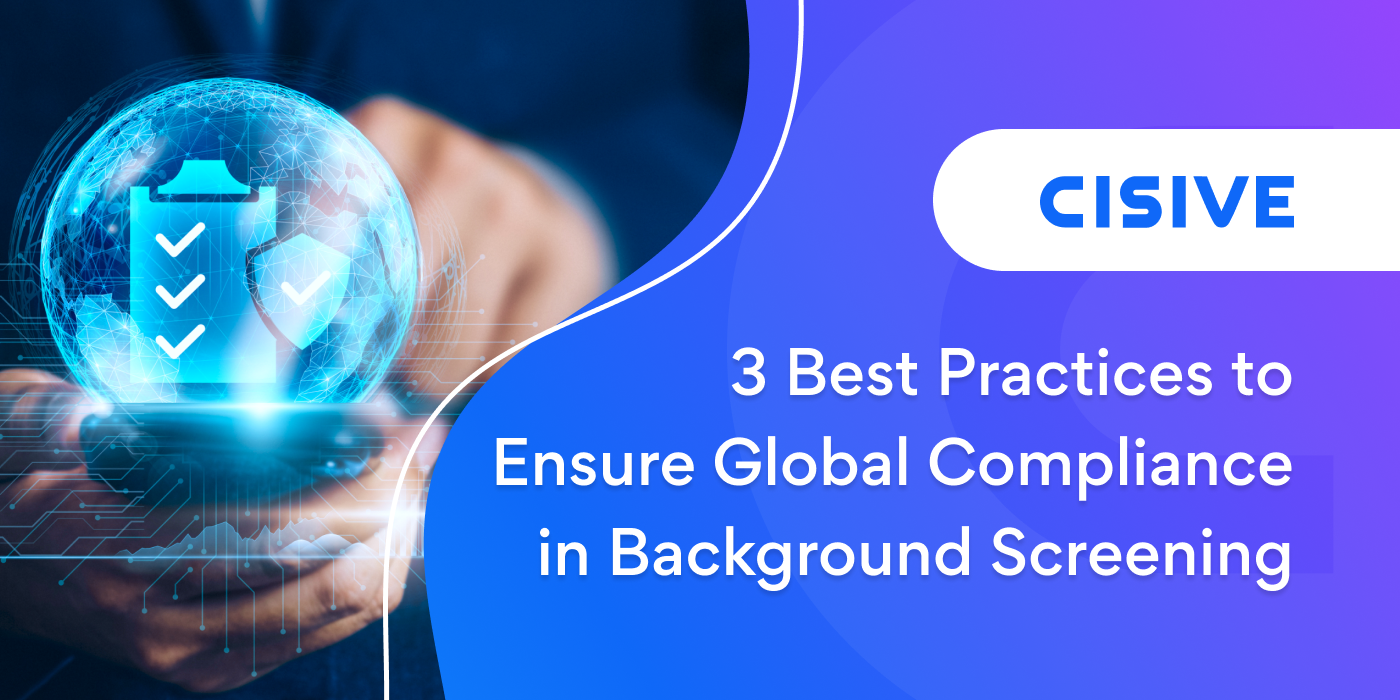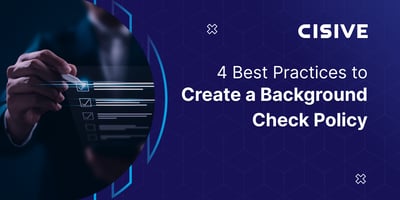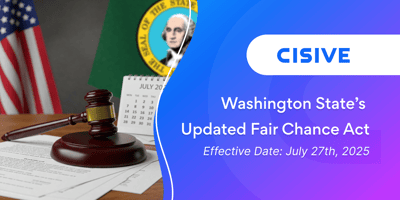

As an HR or talent management pro, you know background checks are valuable in protecting your...

Expanding your business internationally can be a great growth opportunity, but it comes with the challenge of running background checks across borders. Every country has its own rules for consent and privacy, meaning that a best practice in one market could be illegal in another. Global compliance covers a wide range of legal and regulatory requirements across different jurisdictions, including data protection, employment, and trade laws.
The goalposts move all the time, so managing global compliance requires more than automation. Key factors that influence global compliance include varying legal requirements, cultural differences, and ongoing regulatory developments. You need experience, precision, and partnership.
Key Takeaways
|
Why Background Checks Must Align with Compliance Regulations
Key Compliance Challenges in International Background Screening
Best Practices for Ensuring Global Compliance in Background Checks
How Global Compliance Solutions Enhance Hiring and Risk Mitigation
Global compliance solutions are the systems, processes, and services that ensure your background screenings follow laws and ethical hiring standards around the world. Global compliance is an ongoing course of action that requires continuous attention to changing regulations across multiple jurisdictions.
These solutions help businesses reduce risk, streamline hiring, and maintain candidate data privacy. The development of effective compliance programs and procedures is crucial to adapt to evolving global standards. This way, you can use the correct forms, ask the right questions, and make informed hiring decisions. When done well, global compliance solutions blend automation with compliance experts to manage legal and ethical hiring requirements, ensuring that your business meets all legal commitments across jurisdictions.

Failing to comply with multi-jurisdictional screening laws can have serious consequences, including fines, lawsuits, and even restrictions on your business operations. Reputational damage can impact trust and your ability to attract top talent. Beyond legal and reputational risks, noncompliant screenings can create inefficiencies in hiring workflows that may result in a negligent hire.
Country-specific regulations can impose significant fines or sanctions for noncompliance. For example, ignoring consent requirements in Europe’s General Data Protection Regulation (GDPR) can cost millions. In the United States, mishandling background checks and failing to provide equal opportunities can also lead to lawsuits resulting in multimillion-dollar settlements.
Identity validation and background checks matter, but employers must conduct them in accordance with each country’s distinct rules. Proper global compliance management reduces risk by conducting only relevant inquiries and by properly storing and deleting data.
Companies that drop the ball on compliance risk losing trust with job candidates, partners, and regulators. Ethical and compliant hiring practices, by contrast, demonstrate fairness and integrity.
For example, in 2023, a French air freight company violated GDPR by collecting excessive employee information. Not only was the company fined hundreds of thousands of euros, but it also suffered lasting damage to its reputation.
Noncompliance can slow down hiring processes by requiring corrections or repeated screenings. Inconsistent processes can inadvertently reject qualified hires, lead to wrongfully rescinded offers, waste recruiters’ time, and worsen understaffing in situations where hiring is time-sensitive.
Compliant screening and hiring practices are much faster. By pre-emptively aligning screening protocols with local regulations and automating consent management, companies enjoy faster onboarding, fewer errors, and a smoother global hiring process.

The biggest challenge in global background checks is consistency. Different governments impose unique compliance requirements, making it challenging for businesses to standardize processes. Even within countries, local and regional laws can affect compliance. Data is another sensitive area, as many countries govern how data can be stored, transferred, or deleted, especially when crossing borders.
When expanding internationally, businesses must navigate a complex landscape, as most countries have established specific compliance laws related to issues like discrimination.
The Data Privacy Framework (DPF), General Data Protection Regulation (GDPR), California Consumer Privacy Act (CCPA), and Personal Data Protection Act (PDPA) in Singapore impose strict guidelines, but they are regional regulations, not universal. When two or more regulations apply, you must follow the stricter one.
Below are a few of the background screenings that you might need. When operating across regions, you must balance them against global compliance policies:
Criminal background
Education
Employment
References
Identity
Financial status
Explicit, written consent means obtaining a clear and unambiguous “yes” to having personal information collected and used for background checks. Without consent, most background checks will be noncompliant, and possibly a violation of law. This is a protected candidate right in many countries.
How employers gain this consent varies across jurisdictions. Make sure you understand how to obtain consent properly, as failure to do so can void screening results.
It’s not enough to collect consent and follow regional laws. Transferring candidate data across borders introduces compliance challenges, particularly under laws like DPF and GDPR that regulate international data transfers. Companies must comply with regulations governing the import of personal data when transferring information across borders, ensuring adherence to international data transfer requirements. Tools like standard contractual clauses (SCCs) and other safeguards can help you maintain compliance.
The definition and relevance of background screenings vary around the world, with specific restrictions, requirements, and cultural considerations depending on location. It is essential to conduct thorough due diligence to ensure compliance with region-specific screening requirements.
Note that none of this is legal or regulatory advice. Regulations change frequently, and there are many more laws than are mentioned here.
In the U.S., it’s common to conduct thorough background checks and drug tests, but there are regulations like the Fair Credit Reporting Act (FCRA). This law, which regulates background check screening processes as “consumer reports,” includes most categories of information like criminal records, credit reports, motor vehicle records, and verifications products such as education, previous employment, and professional licenses.
Many U.S. states also have “ban the box” laws, which prohibit application questions about a candidate’s criminal history or limit when an inquiry can be made. These laws aim to reduce hiring barriers, ensure fairness, and allow employers to make more nuanced hiring decisions. Employers are required to align their hiring polices accordingly.
In Canada, compliance requires following the Privacy Act, Personal Information Protection and Electronic Documents Act (PIPEDA), and provincial screening laws, among other regulations.
Privacy laws and candidate rights across South America task employers with carefully avoiding discriminatory practices or gaining personal history that’s unrelated to the job.
Brazil recently enacted its General Data Protection Law (LGPD), prohibiting sensitive data collection without obtaining consent and providing transparent notifications. In Argentina, criminal background checks are banned. Individuals may share such information voluntarily.
The GDPR and DPF are the most common sets of global compliance guidelines an employer may encounter. Collectively, they protect the personal data of anyone in most of the EU countries, United Kingdom, Switzerland, and the US; covering how data is collected, processed, stored and transferred.
This sets the baseline in much of Europe, with country-specific employment screening restrictions adding layers. Germany, for example, uses the Federal Data Protection Act (BDSG), which further specifies which types of background checks are legal.
China’s Labor Contract Law sets the framework for background checks, and the Personal Information Protection Law (PIPL) applies to consent, disclosure, and the handling of personal information.
Japan requires explicit written consent from applicants. Only job-relevant information can be collected under the Act on the Protection of Personal Information (APPI). With consent, employers can review identity, education, employment history, and criminal records, but not sensitive information, such as credit.
Australia maintains the Privacy Act and the Fair Work Act, which set guidelines for collecting role-relevant information. Potentially discriminatory information collection, such as race, religion, or genetic information, is considered unlawful.
The Middle East and Africa comprise more than 70 countries, and complying with all local labor laws, regulations, and cultural considerations is complex. Some countries have specific data protection laws, while others have incomplete databases.
Make sure to regularly check for legal and regulatory updates. For example, the 2020s alone have brought updates to the UAE’s Federal Data Protection Law, Egypt’s Data Protection Law, and Saudi Arabia’s Personal Data Protection Law.
In some countries, screenings are also sensitive to religious and cultural values. The Middle East and Africa are diverse and culturally rich, and any background checks should be tailored for cultural appropriateness.

A compliant background check process might be anything but uniform, but with an up-to-date and thoughtful policy, you can collect important information without breaking the law.
Create a global framework that sets your company’s standards but allows adaptation to local laws and cultural expectations. This supports consistent practices without risking noncompliance.
You can implement this approach with a core compliance playbook that outlines the bare minimum needed for screenings. Then, work with knowledgeable screening solutions to add location-specific addenda.
Automated platforms can store consent, track regulatory changes, and generate audit reports, reducing administrative burden and the risk of human error.
Automated consent collection tools should come with time-stamped records, generate alerts when regulations change, and encrypt data. Be sure to set access controls so sensitive information stays private.
Working with experts ensures you stay current with regulations and best practices. A reliable partner like Cisive provides guidance, verification, and monitoring beyond basic screening.
Continuous monitoring, real-time alerts, and policy adjustments help mitigate global compliance risk. Understand the regulations and your company’s compliance processes to maintain a consistent candidate experience, avoid accidental data breaches, and minimize negative outcomes.
Solutions like Cisive empower organizations to conduct thorough, compliant background checks no matter where they operate. By reducing legal exposure, building trust, and streamlining workflows, you can focus on hiring the right talent without risking regulatory violations.
Compliant workforce management doesn’t stop with onboarding. Comprehensive ongoing monitoring helps you keep up with:
Criminal history
Driver risk
Healthcare credentials
Financial anomalies
Combining Cisive’s industry-leading technology with expert knowledge, you can make faster hiring decisions that hold up to ethical, legal, and regulatory scrutiny.
Protect your people and maintain trust with candidates and regulators, no matter where they are. With the right tools, expertise, and monitoring in place, you can stay compliant, hire confidently, and protect your brand. Cisive provides the technology and expert resources you need to stay compliant throughout the employee life cycle.
Talk to a Cisive background check pro to see how it’s done.
Author: Michael Kendrick
Bio: Senior Manager of Corporate Compliance at Cisive.
Let's Connect on LinkedIn
As an HR or talent management pro, you know background checks are valuable in protecting your...

The stakes in talent intelligence are high. Failing to conduct thorough background checks on a...

Beginning July 27, 2025, Washington State will implement a newly revised Fair Chance Act, expanding...